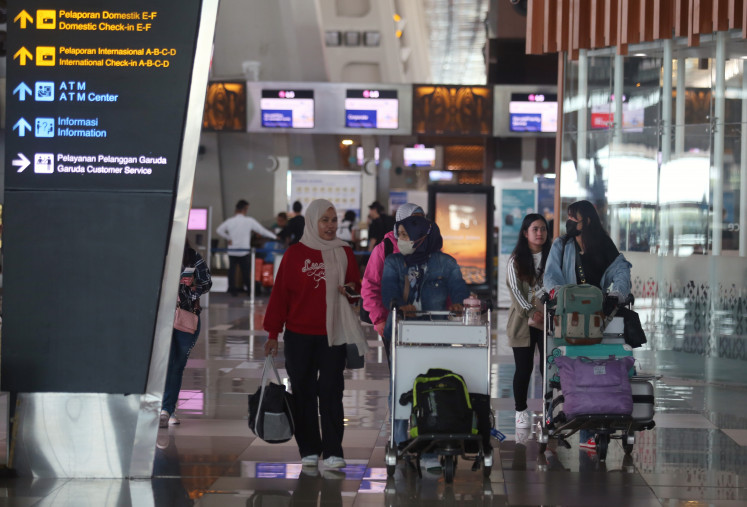Trump's travel ban will spark radicalization
The most recent order is extremely dangerous not just because it represents a racist and extremely xenophobic paradigm, but also because the consequences that might follow after the implementation of such policy.
Change Size
 Standing for the rights -- Protesters assemble at John F. Kennedy International Airport in New York, on Jan. 28, after two Iraqi refugees were detained while trying to enter the country. On Jan. 27, President Donald Trump signed an executive order suspending all immigration from countries with terrorism concerns for 90 days. Countries included in the ban are Iraq, Syria, Iran, Sudan, Libya, Somalia and Yemen, which are all Muslim-majority nations. (AP/Craig Ruttle)
Standing for the rights -- Protesters assemble at John F. Kennedy International Airport in New York, on Jan. 28, after two Iraqi refugees were detained while trying to enter the country. On Jan. 27, President Donald Trump signed an executive order suspending all immigration from countries with terrorism concerns for 90 days. Countries included in the ban are Iraq, Syria, Iran, Sudan, Libya, Somalia and Yemen, which are all Muslim-majority nations. (AP/Craig Ruttle)
P
resident Donald Trump has sprung yet another shock after he realized his dangerous campaign promise: banning travelers from several Muslim-majority nations from entering the United States.
It is particularly ironic that Trump’s decision came on Holocaust Remembrance Day (Jan. 27). Seven countries from the Middle East and North Africa, namely Iran, Iraq, Syria, Libya, Yemen, Somalia and Sudan, were included in the ban list in his recent executive order.
Citizens of these seven countries are deemed as posing a serious security and terrorist threat to the US. Accordingly, banning them is the best option to make America safer. In addition, this order clearly states that it is just the beginning of a broader ban in the future.
In other words, other Muslimmajority countries are open to being added to the list.
Previously Trump had signed an executive order to build wall along the border between the US and Mexico.
The most recent order is extremely dangerous not just because it represents a racist and extremely xenophobic paradigm, but also because the consequences that might follow after the implementation of such policy.
There are at least three serious consequences that might follow from this policy.
First and foremost, the ban may galvanize protests and anger not only in the seven countries but also in the rest of the Muslim world. This anger could lead to violent protests as happened when Prophet Muhammad PBUH was insulted in the European publications Jyllands-Posten and Charlie Hebdo in previous years.
Furthermore, it will harm relations between Muslim citizens and minority groups that are associated with the West such as Christian communities in Muslim-majority countries, including Indonesia. Given the unjust and oppressed condition of fellow Muslims in the US, Muslim communities might vent their anger on Christian communities that they perceive as synonymous with the West.
Second, this discriminatory ban on travelers from specific Muslim-majority countries will equip the extremist groups with “a weapon and ammunition” in radicalizing and recruiting Muslims around the world. It is widely recognized that the radical and extremist groups frequently exploit the suffering of Muslims across the world to galvanize anger and radicalization in recruiting their supporters. The anguish of Muslims across the world has generated the “global Jihad” movement as represented in the case of Bosnia and Afghanistan, and the Syrian war recently.
Akbar Ahmed eloquently reveals that the sense of “Islam under siege” has been a central point of understanding why certain people are committing acts of terror in the name of Islam around the world. According to Ahmed the global war on terror led by the US is perceived as not only targeting Muslim individuals, but also targeting Muslim countries as “terrorist states” such as Iraq, Iran, Pakistan and Syria.
With this in mind, it is ironic that a majority of the banned countries have experienced invasions or overthrows by US administrations. It is exacerbated by the Trump’s statement that torture “absolutely works” in interrogation. Undoubtedly, such a policy strengthens the sense of “Islam under siege” within Muslim communities that could be potentially exploited by extremist groups.
Third, it will reproduce the divisive discourse of the global war on terror after 9/11. It will resonate with former US president George W. Bush’s controversial tenet of the global war on terror that nations of the world must be “with us or against us.” The ban on citizens from the seven Muslim-majority countries is likely to divide the Muslim world into two contrasting camps, namely “good guys” and “bad guys”.
In this sense, it reproduces the divisive discourse between “good Muslims” and “bad Muslims” that existed after 9/11. Here “good Muslims” are the “moderates,” “liberals” and “secularists” that should be embraced by the West, while the “bad Muslims” are the “radicals,” “extremists,” “Islamists” that should be shunned. At his point, it is obvious that the citizens of the seven countries targeted are “bad Muslims” who should be prohibited from entering the USA.
To sum up, rather than making America and the world safer, Trump’s policy will benefit extremist groups as well as generate anger and hostility against the West and all things associated with it in the Muslim world. In other words, we are going to witness the spark of a fire across the world as Trump has decided to “fight fire with fire.”
***
The writer, a former researcher at the Centre for Security and Peace Studies, Gadjah Mada University, Yogyakarta, is a post-graduate student at the University of Essex in the United Kingdom funded by the British Chevening Scholarship.
---------------
We are looking for information, opinions, and in-depth analysis from experts or scholars in a variety of fields. We choose articles based on facts or opinions about general news, as well as quality analysis and commentary about Indonesia or international events. Send your piece to community@jakpost.com. For more information click here.








